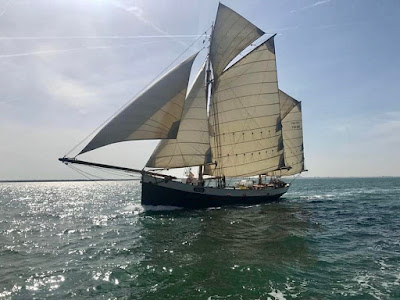Considering the following was happening a year ago this month, I thought it appropriate to post. It's from some notes I wrote to Latitude38. Some of it is a little generic. I suppose I could write about the rest of the trip next, we did double Cape Horn under sail alone... Special thanks to Erica for nudging me back on here...
...After spending the past six years working and sailing, including two winters of school in the Netherlands, I’ve ended up here; as mate on the gaff ketch Tecla, sailing from Alaska to the Falkland Islands via Galapagos, Easter Island and Cape Horn.
I’ve found there is much to be gained from sailing these traditional ships, from vigilance and hard work to a healthy respect for nature and the forces that occur at sea. Not only are there the physical aspects, but also the mental ones; patience, trust and everything else that comes with living with so many other souls for months on end. You learn to appreciate the little things in every day, and all the burdens of life in a twenty first-century first-world country suddenly lose their priority. People talk about the benefits of a “digital detox” but this is so much more. There are also endless things to learn about how to sail the ship well and how to maintain it. These ships have histories, and sailing them allows you to become part of it.
This trip from Alaska to the Galapagos is an unusual one. Tecla completed the Northwest Passage in 47 days from Illulissat, Greenland to Nome, Alaska, arriving on September 16, 2019. Because of the uncertainty of the ice letting her through to the Pacific side, the guest bookings couldn’t be confirmed until a few weeks in advance of her arrival in Nome. So this trip we were 4 to Dutch harbor and now only 6 on board. Being on time for start of the Antarctic summer also meant that this trip would be limited to one stop (Dutch Harbor). So we’d be spending a lot of time together offshore.
With this long passage in mind, I stuffed a few issues of Latitude into my bag as I left home. Man, were they a hit on board! My watch mates, Australian and Dutch, found the “Latitude Thirty Eats” excellent breakfast perusal material. Soon there were discussions on the demolished derelict boats, the Baha-Ha-Ha profiles and of course the Letters.
The leg from Nome to Dutch Harbor was a rough one, and we were only 4 at that point. The Bering Sea is a wild place filled with depressions even during the best time of year. The short steep waves are similar to the ones in the North Sea, and they are incredibly uncomfortable. There was an ugly looking depression on the forecast, so we set what reefed sails we could and flew almost the whole way at 8 and 9 knots. It took our full strength the hoist the main with 3; any sail changes required all of us, which means less sleep if the weather changes while you're in your bunky... The rugged coast of Unalaska Island was a welcome sight, and we took shelter in Dutch Harbor for a few days. Dutch Harbor is quite famously the seasonal base for many Bering Sea fishing boats, and despite being surrounded by glaciers and extinct volcanoes there is very little going on besides the fishing industry. Oh and wild blueberries!
 |
| Approaching Dutch Harbor |
After our departure from Dutch, I was impressed at the size of the Gulf of Alaska! As we sailed rather quickly east to get on the right side of the Pacific high, our position on the small-scale chart crept along like a tiny lethargic bug. Eventually we were able to start our way south with the wind, and that was when we started going like a rocket. In fact, our progress was so good that it allowed us to make a stop in Santa Cruz. Having been mostly away sailing the last six years, it was a very special experience for me to bring a ship into my homeport! It was a meeting of worlds seeing Tecla anchored in Cowells.
 |
| Close-hauled day on the Gulf of Alaska |
 |
| Sunset in Santa Cruz |
We had another epic sail leaving Santa Cruz, but eventually the wind petered out and left us rolling around about 200 miles off the Socorro Islands. Some lighter breezes slowly pushed us towards the equator, but the rest of this trip has been wrought with light airs and mixed seas. Not only was the weather trying, we received news from the officials in the Galapagos that we now required an inspection and hull cleaning in Ecuador before being allowed to stop in the Galapagos. This meant sailing right past the islands to Salinas. It was a little demoralizing. However a nice little puff of wind came up yesterday to blow us the last little way into Salinas. We are now stocking up on some nice fresh veggies and with the inspection hopefully finishing Monday, we will be on our way again.
 |
| Messy mid-ocean hitchhikers |
 |
| Swimming in a calm |
